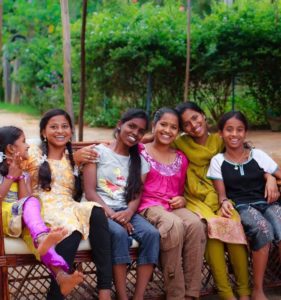The following post was submitted by Kim Burnett, President of Shadhika – a nonprofit organization investing in the education, empowerment, and economic self-sufficiency of girls for India’s future.
When we arrive, we are greeted by a colorful ‘rangoli’ (see photo). We are told later that the girls make every day, but that today’s is special — one of the girls spent over three hours preparing it in our honor. Even before we get to the rangoli though, the girls have come to meet our car and shouts of “Welcome sister”, “Good to see you again, sister” ring in our ears. The girls take our hands and lead us in.
So begins our day at Baale Mane, Shadhika’s partner in Bangalore, India
The overwhelming emotion one gets from visiting Baale is love and joy – these girls are so joyful and Baale’s founder, Mary and her staff have created a very loving home for these girls. Because of this, it’s easy to forget the tragic and often harrowing journeys that brought each of these girls to be here. Baale currently supports 50 girls — 50 girls that each have their own story of hardship – orphaned after her parents died of HIV/AIDS, abandoned on the streets by her father after the death of her mother, rescued by the police after repeated abuse by her stepfather, or lone survivor after her father murderer her mother and younger brother. We hear these stories but we do not dwell on them. Because at Baale the girls are taught that while these experiences are a part of their lives, they do not define who they are or limit their futures.
These girls are learning this lesson, in part, as a result of their new Life Skills course, that Baale launched just this past June with a grant from Shadhika. This course is needed because, like our foster care system in the U.S, all Baale Mane girls must leave the Baale home at age 18 and live independently in the city. This course is designed to prepare the girls for this change. The course serves girls from ages 13 – 24 – serving girls before, during, and after their transition to independence.
During our visit, we met with the girls taking the class who are between 16-18 — what Baale calls “transition girls.” These girls are in class 11 or 12 so they are on the cusp of graduating and moving into the city for college.
In our discussion with them, the girls share what they have been learning so far as part of this course. (It should be noted all of our discussion was done in English – something that has improved remarkably since my last visit in November 2015. Again, this is due to Shadhika’s support, which is underwriting a high quality English language intensive course for all girls participating in the Life Skills Course.) The girls talk about an independent outing they had over the summer where they had to take the bus to the city, go to the vegetable market, and buy/ bargain for vegetables for Baale on a budget ($1,000 Rs). For all of them, this was the first time taking the bus on their own, navigating the city, and being responsible for such an important task. They shared that they were initially afraid to do this but it was also very clear how proud they felt that they accomplished this — even coming back with some money to spare!

The girls also showed us what Baale calls their “Life Skills Care Planning” books — workbooks with exercises to help the girls keep to think about / explore issues ranging from sexual health, to self-confidence, to their strengths and weaknesses, to interpersonal relationships, to career planning.
One of these exercises stood out for me. The girls were asked to write letters to their future daughters, full of their hopes and dreams and advice for them. I’m attaching a picture of Shalini reading her letter. In her letter, she warns her future daughter against child marriage. “You should play with your friends, not your own children,” she warns. What makes this letter all the more profound is that less than one year ago, when she was just 16, Shalini was kidnapped from Baale by her extended family who were forcing her into an arranged marriage. They took her over 50 miles away, to her village. With help from her brother, she was able to escape and after several days, she found her way back to Baale.
Even though Baale is a wonderful, safe loving home, these girls are like many of us when we were their age. They yearn for their own place, a home where they are not “placed” but a home that they create by themselves, for themselves, in their own way and on their own terms. A home where they truly belong.
Baale is helping them prepare for that dream. And in our own small way, I think we left our visit with them seeing how Shadhika is also helping in that.
We should all feel pretty good about the impact at Baale and throughout our projects. We truly are helping these girls realize their aspirations.
